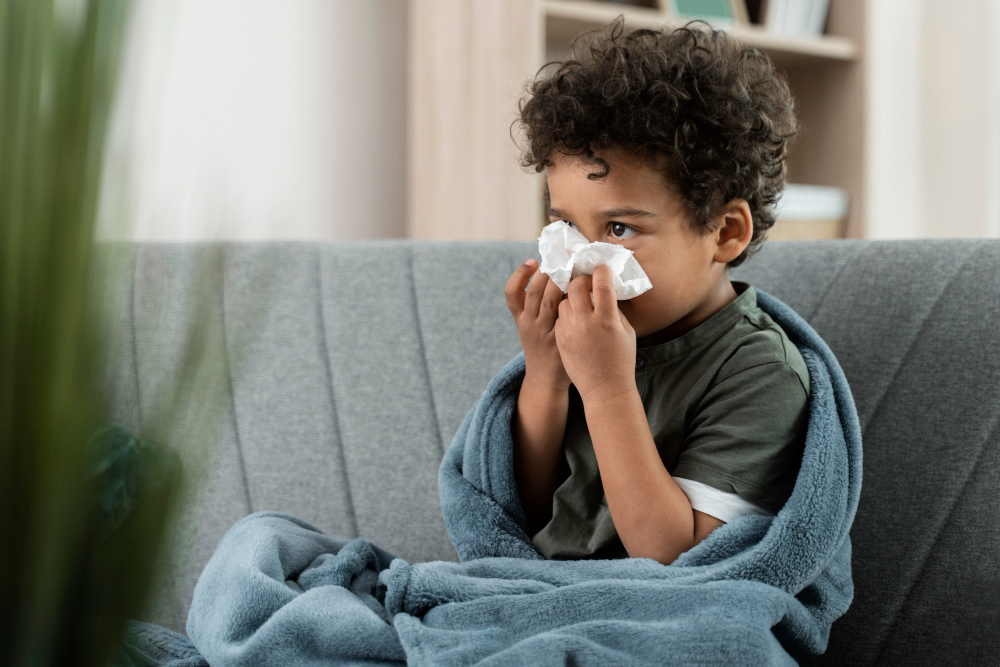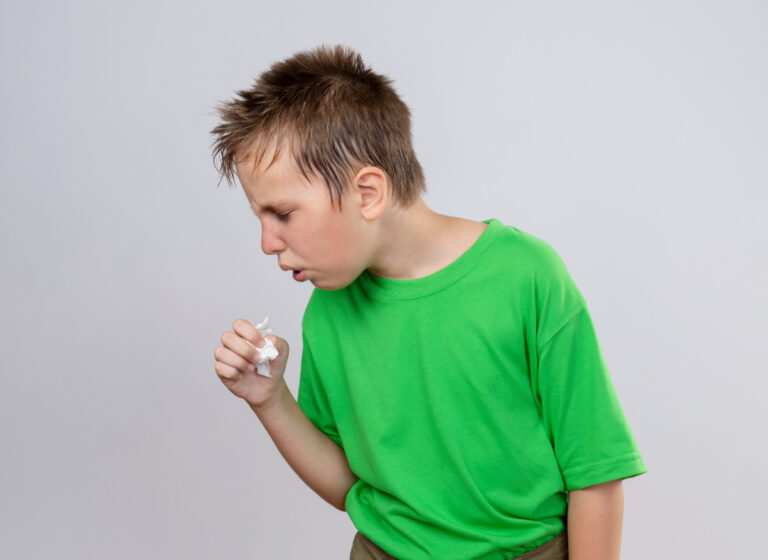There are numerous causes for children’s coughs, and it can be challenging for parents to identify the cause of their child’s cough and when to take them to the paediatrician.
A child’s cough is usually not a cause for concern. Parents should anticipate that their children may experience multiple colds each year, particularly in the fall and winter, which may cause coughing as a side effect. However, there are instances in which calling your child’s physician is crucial.
Michael Lee, M.D., UT Southwestern professor and paediatrician with Children’s HealthTM, offers the following advice to parents to help them understand the severity of their child’s cough and what it might mean: “As a general rule, if your child has a cough that is getting progressively worse and/or lasting longer than five to seven days without improvement, it’s a good idea to have them seen by a medical professional.”
What is the source of my child’s cough?
These are eight typical reasons why kids cough and when it’s appropriate to take them to the doctor.
Cold
A wet, productive-sounding cough with mucus or phlegm behind it is frequently the result of the common cold.
If your kid has a productive cough that barks and their voice gets raspy, get in touch with your paediatrician. There’s no need to give your child special medication if they have a cold. Remind your child to blow their nose (or use a suction nose for babies), stay well-hydrated, and take breaks as required. As long as there is no temperature for 24 hours without taking medication, your child can stay in school. Children should not usually be prescribed cough and cold remedies.
Allergies
Children younger than the ages of two to three are usually not affected by seasonal allergies. Seasonal allergies can include runny nose, itchy, watery eyes, coughing, congestion, sneezing, and occasionally sore throats. Allergies, however, rarely result in fever, pains, or weariness.
If the symptoms of your child’s allergy continue, contact your paediatrician. Depending on your child’s age and symptoms, the doctor may recommend or prescribe allergy medicines. Get in touch with your child’s paediatrician if they are still experiencing symptoms despite being on medication for seasonal allergies.

RSV
The respiratory syncytial virus, or RSV, is a particular virus that resembles the typical cold in symptoms, but in newborns or young children, it can be difficult or even fatal.
If your kid is experiencing hard, rapid breathing, get in touch with your paediatrician. Breathing difficulties could be something you see rather than something you hear. With every breath, you could observe your child’s ribs moving in and out and their chest constricting. You should call your child’s physician right away if you observe any of these symptoms.
Bronchiolitis
The RSV virus is the most frequent cause of bronchiolitis, however other viruses can also produce similar symptoms. Children two years of age and younger are most commonly affected by bronchiolitis, which results in wheezing and breathing difficulties.
If your child’s dry cough starts to click, bubble, or rattle as they breathe in, they should see a paediatrician. Additionally, it could be necessary to contact your child’s physician if they are experiencing difficulty breathing.
A case of pneumonia
Pneumonia symptoms in children differ from those in adults, and they are often extremely mild. However, a high temperature is usually present with pneumonia. Age and the pneumonia’s underlying aetiology will also affect the symptoms.
If your kid has a high temperature, persistent cough, fast or laboured breathing, or any combination of these, contact your paediatrician.
Inhalation
According to the Beyond ABC research, asthma is the most prevalent chronic illness in children, affecting about one in ten of them, including over 156,000 in North Texas. Asthma episodes can occur suddenly and be brought on by a variety of things, including as physical activity, exposure to air pollution and cigarette smoke, cold air, excitement, laughing, and roughhousing.
Speak with your kid’s paediatrician if: Your child is coughing up hackles and makes a high-pitched, whistle-like sound when they exhale.

Croup
A child has to work harder to breathe when they have croup because of swelling in the upper airway, which includes the throat and nose. Boys are prone to croup more often than girls, and it usually develops in the fall and winter. Although croup can strike a child at any age, children under the age of five are more likely to get it.
If your child coughs and makes a characteristic “barking” sound when inhaled, it could be croup. Speak with your paediatrician about this. You should call your child’s physician right away if you observe any of these symptoms.
The pertussis
Whooping cough, or pertussis, is a highly contagious respiratory mucous membrane infection. A series of immunisations can prevent pertussis, a bacterial illness that is easily spread through infectious coughs and sneezes.
Consult your paediatrician if: Your kid coughs violently and repeatedly, sometimes followed by a whooping-like high-pitched breath intake.
Is my child suffering from COVID-19?
The respiratory virus COVID-19 is highly contagious and can produce a variety of symptoms, such as fever and cough. Children as well as adults can contract COVID-19 and experience mild to severe sickness. Without testing, it is impossible to distinguish COVID-19 from a cold or upper respiratory illness. To rule it out, it is therefore best to get tested for COVID-19. Your youngster should keep themselves apart from people who are not ill if they test positive for COVID-19. To prevent COVID-19, it is recommended that all eligible individuals receive the COVID-19 vaccine.
If your child develops any of the following symptoms, call your paediatrician: fever, chills, cough, shortness of breath or trouble breathing, exhaustion, headache, aches in the muscles or body, loss of taste or smell, sore throat, congestion or runny nose, nausea/vomiting, or diarrhoea. If your child exhibits any combination of these symptoms, they should get tested for COVID-19, especially if they have come into contact with an infected person.
How to treat a cough in a child
Regardless of the reason behind your child’s cough, you might attempt the following home remedies:
- Drink more fluids. Increasing the amount of fluids your child consumes can help ease their sore throat and facilitate coughing up lung mucus.
- Take a moment to sit up straight. Sleep deprivation can impede your child’s ability to recuperate from illness, but getting enough sleep is essential. To make it easier for your youngster to fall asleep, try raising the head of the bed by tucking a few pillows underneath the mattress.
- Take into account increasing the humidity. Your child’s breathing might be made easier by taking a warm bath or shower, and you could try keeping a cool-mist humidifier in their room overnight.
- Get rid of irritations. These may consist of tiny particles, cigarette smoke, and chemical vapours.
Above all, administer over-the-counter drugs with caution. Cough suppressants are not advised for use in youngsters as they frequently cause more damage than help. But for pain or fever, kids might need to take an over-the-counter drug like acetaminophen. Pay close attention to the instructions. Before providing any over-the-counter medication to a child under the age of six, always get in touch with their doctor. Find out more about treating kids’ coughs at home.
Make an immediate appointment with your paediatrician if you have concerns about your child’s cough, particularly if they are having difficulty breathing.


